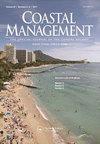Adapting to Sea Level Rise: Insights from a New Evaluation Framework of Physical Design Projects
IF 1.9
4区 环境科学与生态学
Q4 ENVIRONMENTAL SCIENCES
引用次数: 5
Abstract
Abstract Designers and engineers are developing proposals for physical projects to adapt coastal sites to future sea level rise related threats. This puts pressure on local and regional decision makers to develop strategic frameworks for prioritizing, permitting and funding such projects. However, no systematic evaluation tools exist for the full range of these innovative designs. We build on the literature to develop an evaluation framework that synthesizes two different approaches to categorize these proposals and provide insight for coastal managers and decision makers. We apply this framework to physical projects that address sea level rise in their design around the San Francisco Bay Area, a leading region in sea level rise adaptation. We find that these projects demonstrate a shift toward more habitat-focused strategies, which likely marks the beginning of a larger transformation of the coastal zone. According to our five-part evaluation tool, we also find that the projects’ scores have improved over time, indicating that state agency work may be helping communities implement more flexible adaptation initiatives. Despite these positive signs, we also find that none of the projects achieved high marks in all five of the evaluation criteria. This finding indicates that there is a critical need for improvement in physical planning for adaptation to higher sea levels and associated impacts. Most importantly, we find that an evaluation framework such as the one used here can provide critical insights into the likely risks and benefits of proposed adaptation projects and their long-term implications for coastal zones.适应海平面上升:从一个新的物理设计项目评估框架的见解
设计师和工程师正在开发物理项目的建议,以使沿海地区适应未来海平面上升相关的威胁。这给地方和区域决策者带来了压力,要求他们制定战略框架,优先考虑、批准和资助这些项目。然而,没有系统的评估工具存在于这些创新设计的全部范围。我们在文献的基础上开发了一个评估框架,该框架综合了两种不同的方法来对这些建议进行分类,并为沿海管理者和决策者提供见解。我们将这一框架应用于围绕旧金山湾区(一个适应海平面上升的领先地区)设计的应对海平面上升的物理项目。我们发现,这些项目展示了一种转向更注重栖息地的战略,这可能标志着沿海地区更大转型的开始。根据我们的五部分评估工具,我们还发现,随着时间的推移,项目的得分有所提高,这表明州政府机构的工作可能正在帮助社区实施更灵活的适应举措。尽管有这些积极的迹象,我们也发现没有一个项目在所有五个评估标准中获得高分。这一发现表明,迫切需要改进物理规划,以适应更高的海平面及其相关影响。最重要的是,我们发现这里使用的评估框架可以为拟议的适应项目的可能风险和收益及其对沿海地区的长期影响提供关键的见解。
本文章由计算机程序翻译,如有差异,请以英文原文为准。
求助全文
约1分钟内获得全文
求助全文
来源期刊

Coastal Management
环境科学-环境科学
CiteScore
6.00
自引率
0.00%
发文量
24
审稿时长
>36 weeks
期刊介绍:
Coastal Management is an international peer-reviewed, applied research journal dedicated to exploring the technical, applied ecological, legal, political, social, and policy issues relating to the use of coastal and ocean resources and environments on a global scale. The journal presents timely information on management tools and techniques as well as recent findings from research and analysis that bear directly on management and policy. Findings must be grounded in the current peer reviewed literature and relevant studies. Articles must contain a clear and relevant management component. Preference is given to studies of interest to an international readership, but case studies are accepted if conclusions are derived from acceptable evaluative methods, reference to comparable cases, and related to peer reviewed studies.
 求助内容:
求助内容: 应助结果提醒方式:
应助结果提醒方式:


